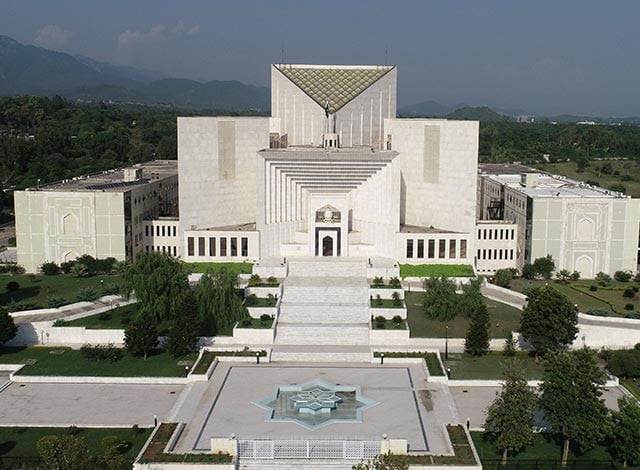CB declines to assign seats in part.

A request by the Sunni Ittehad Council (SIC) to provide the PTI reserved seats in proportion to 39 MNAs who declared their affiliation with the party when submitting nomination papers for the February 2024 elections was denied by a Supreme Court constitutional bench (CB) on Tuesday.
The petitions contesting the SC’s July 2024 majority ruling for the PTI’s distribution of reserved seats were considered by the eleven-member CB, which was presided over by Justice Aminuddin Khan.
A three-member Supreme Court bench affirmed the Election Commission of Pakistan’s (ECP) December 22, 2023 ruling that the PTI’s intra-party elections were invalid on January 13, 2024.
The PTI candidates were then forced to run as independents in the general elections on February 8, 2024.
In an apparent attempt to secure seats designated for women and minorities, 80 of these independent candidates made it to the National Assembly before joining the SIC. However, the ECP declined to give the party seats, a decision that the SIC contested in the Supreme Court.
By a majority vote of 8 to 5, the entire bench of the Supreme Court reinstated the PTI as a parliamentary party on July 12, 2024, pointing out that 39 of the parliamentarians who had included certificates of affiliation with the PTI with their nomination papers were actually PTI members.
The Supreme Court decided that the 41 MPs who had not yet turned in their affiliation certificates at the time their nomination papers were turned in might do so immediately, within 15 days.
The majority ruling ruled that 41 candidates were not linked with any party, and Justice Jamal Khan Mandokhail had noted at the last hearing that the ECP was correct in the instance of 41 and incorrect in the case of 39. Based on the 39 MNAs, the SIC’s attorney asked that the PTI be given the reserved seats.
Justice Muhammad Ali Mazhar questioned whether the ECP had declared all 39 parliamentarians to be PTI members during Tuesday’s hearing.
According to Justice Mandokhail, perhaps 22 or 23 reserved seats had to be distributed based on the 80-seat ratio. Justice Mazhar responded, “If 39 members have been declared as part of the PTI, then why haven’t the reserved seats been allocated according to that proportion?”
According to the ECP director general of law, seats will be distributed using an aggregate total of 80. In response to Justice Hasan Azhar Rizvi’s question, he stated that no other party has yet to be assigned seats.
The attorney for the ECP contended that following the Supreme Court’s July 13 ruling, parliament passed a statute that made it impossible to alter a political affiliation once it was stated in the nomination papers. The law was implemented retroactively, he continued, and a review petition was still pending.
The request to enforce the Supreme Court’s ruling on the PTI’s allotment of reserved seats for the 39 assembly members was later formally rejected by the court’s constitutional bench.
Faisal Siddiqui had previously addressed the criticism over the prolongation of the reserved seat deadline. He said the ECP released a new schedule following the 2018 elections.
Using a pun, he claimed that the timetable was released when the Balochistan Awami Party, or BAP, which is widely considered to be the king’s party, came forward. “After all, Baap is Baap (a father is a father),” he continued.